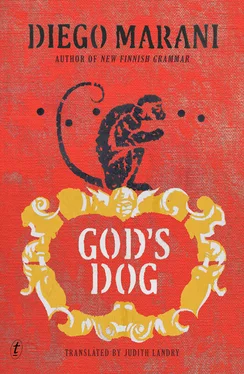‘That’s Signora Loiacano! How young she looks! Look, Teresa!’ Salazar snatched the photograph from her hand.
‘Do you know where she lives? Does she come here often?’
‘She’s been a client of ours for years. But I don’t know where she lives. I think she’s local, though, because I often see her go by with shopping bags.’
‘Thank you,’ said Salazar, and slipped out of the shop under the curious gaze of the two assistants. He wandered aimlessly through the streets around Piazza Risorgimento, looking at people at the tram stops, in shop windows and doorways with the secret hope of catching the woman by surprise. She lived round here; at this very moment she might be in the supermarket on the corner or the café opposite, or perhaps, unknown to him, she was at some window, observing him from behind the curtains. Salazar looked up at the uncommunicative façades of the buildings which lined the street: closed curtains, blinds half-down, the frosted glass of surgeries and offices. He looked at his watch: by now it was two o’clock and he hadn’t had anything to eat. He went into a bar and ordered a sandwich, casting an eye at the television that was hanging from the wall, at the piles of Easter eggs in the window and at the headlines of the newspaper being read by the man seated at the bar’s only table. The man had heavy, stumpy hands; when he put down the paper, Salazar saw that it was the South American from San Basilio!
I’ve missed a trick here, no two ways about it. I should have followed the woman throughout the day, and searched the flat on Via Cornelia from top to bottom. I made a play at catching her out; in fact, the opposite has happened. I didn’t think that things in Italy had come to such a pass. These Free Death Brigades mean business. I am far from convinced that self-serving orthodoxy is the most effective strategy. Ever since abortion, the pill, assisted fertilisation and euthanasia were proclaimed terrorist offences, anonymous accusations have been raining down on the desks of the papal police, and those in charge of anti-terrorist activities have been wasting their time hunting down a handful of offenders in order to be able to boast of some headline-grabbing arrest. University professors, journalists, even the odd priest have fallen into the trap. Banner headlines, triumphal announcements, everyone congratulating everyone else, but where does this get us? Here every member of the hierarchy dons the mantle of defender of the faith and vies with all others in observance of the Catholic rule — purely to earn promotion, to curry favour, to procure themselves important positions in the curia. But, by so doing, such men lose sight of their goal. Here we see that same obtuseness which caused us such bitter setbacks in the past. Dogma is to be used against atheists, not against ourselves. There is no point in even trying to cure incurable ills. Giving placebos instead of drugs would solve the problem of euthanasia, as well as exposing the limits of what medicine can do. Courts sitting in judgement on the course of a disease serve no purpose, indeed they are counterproductive. The principle is correct: a sick person cannot take his own life because it is not his to take, it has been bestowed on him by God. But when decisions about treatment are entrusted to a court, and not to the patient himself, or to his family, then inevitably there will be ill-feeling. There are other, less controversial ways of taking this decision out of his hands. Indeed, he should be allowed to choose his own treatment: he will never know what is in the pills that he swallows. What counts, all in all, is not to prolong a man’s life for as long as possible, but to remind him that death is his destiny. That way, he is more likely to give himself over to the Church. What the curia is interested in above all is getting its hands on the property of the euthanasiasts, and may thus be seen as gaining material advantage from the situation; but that is tantamount to paving the way for the angels of death. I shall draw attention to this paradox in my report on this mission. Perhaps some enlightened spirit in the curia will read it.
I’m worried about Guntur; he hasn’t answered my last e-mails. It’s too risky to telephone him. I’ll try and contact him again by e-mail tomorrow at the same time. There’s an internet point near the church of Sant’Andrea della Valle.
That Friday, the church seemed to be empty. The canon who normally stayed behind to tidy up the missals had already left; no one had come to clean the candlesticks or empty the collection boxes. Then Salazar saw the curtain being pulled back and caught sight of the black shoes, but when he knelt down in the confessional he was surprised not to smell the usual scent of mouthwash. Obeying orders, he recited the credo, gave his registration number and launched into his speech.
‘Vicar, I have news. A man died in the hospital. At first sight it looked like a natural death, but I’m sure it was euthanasia. Unfortunately the angel of death slipped through my fingers, but now I’m on the scent. I may even have a name. I know how they operate…’
Hearing unusual sounds from behind the grille, Salazar broke off. He noticed that the curtain on the other side was half-drawn. He glimpsed something glittering, then heard the click of a gun being loaded. He threw himself out of the confessional just as three bullets fired from a pistol with a silencer hissed through the brass grating and sank into the marquetry, splintering carved putti and garlands as they did so. Staggering around behind a pillar, Salazar managed to pull out his own gun, fired several shots in the direction of the confessional, then rushed to take refuge behind the chapel wall. The shots reverberated through the church like thunder; a light rain of shattered plaster pattered down on to the floor. Huddled on the ground, the inspector strained his ears, expecting further shots. For one brief moment the distant din of the traffic could be heard through the silence. Then a thud, the crash of overturned chairs and, a few moments later, a sound of shuffling coming from the high altar. Salazar trained his gun on the shadowy figure which had appeared on the stairs below. The canon, who had come back into the church on hearing the sound of the fracas, was holding up his hands and shaking his head; rigid with fear, he was staring into space, his chin quivering. Then Salazar emerged from behind his pillar and ran into the nave, peering between the rows of benches towards the confessional. Stretched out in a puddle of blood lay a man half-enveloped in the purple curtain which he had brought down with him as he fell, his gun still in his hand. Salazar went closer and turned the body over. He was a young man, with an olive complexion and a haircut like that of a cadet; his eyes were wide open — both of them. Salazar went through his pockets, extracting a bunch of keys, a mobile phone, two cartridge clips and a badge just like his own. The man was a Dominican.
A north wind had got up, giving a sheen to the paving and the facades of the houses, whipping up swirls of dust which settled on car bonnets. An empty tram jangled along Corso Vittorio Emanuele; the last shutters were coming down. Salazar walked fast, avoiding passers-by, trying to collect his thoughts. The person who had killed the Vicar clearly knew about their meetings; perhaps he had been on his trail ever since his arrival in Rome. That would explain the unexpected visitors to the convent. It would also solve the mystery of the stolen paintings. It was him they were looking for. He had not expected such reckless behaviour; he had been proved wrong. These people are dangerous, he thought; but now they were the only trail he had. Someone was undoubtedly lying in wait for him in the convent. That was where he had to go. He was well aware that it was dangerous; but he had to amass further proof. He went into the first church he came upon, to get his breath back and consider his situation. The silence and the scent of incense calmed him. He took his aggressor’s mobile phone out of his pocket. The address book had just ten numbers, referred to by the signs of the zodiac, but he did not have the password. He thought of the dead man, the supposed cadet, who had probably just left the academy; he imagined the lectures his superiors would have given him. Suddenly sure of himself, he typed in domini canis , and found just one file, headed Semana Santa. It was a plan of the security measures for Benedict XVI’s canonisation ceremony, down to the last detail: the make-up of the squads of guards, the positions of the marksmen and telecameras, the route to be taken by the pope, the seating arrangements for the great and the good on the podium, the teams who would be manning the police vehicles, the general running-order, with comments, and the timing of the entry of the various groups for the final parade. Salazar read it carefully. Useful though it was, he could not run the risk of keeping that phone in his possession. When he had memorised its contents as best he could, he took out the battery and removed the microchip, broke it in two and threw the pieces into the vases of cut flowers on the altar. Now he had to brace himself to return to the convent.
Читать дальше












